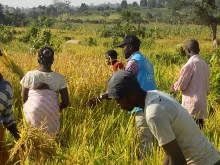Earlier this year the UN Refugee Agency (UNHCR) recognised Uganda as one of the best countries in the world for refugees to live, since they are given opportunities to work, freedom of movement, access to education, health care and a secure environment.
Uganda is home to over half a million refugees residing in settlements and urban centres all over the country. Earlier this year the UN Refugee Agency (UNHCR) recognised Uganda as one of the best countries in the world for refugees to live, since they are given opportunities to work, freedom of movement, access to education, health care and a secure environment.
Providing protection, assistance and finding durable solutions for refugees, asylum seekers, internally displaced persons (IDPs), stateless people and those displaced by natural disasters is UNHCR’s core business. With the continuous influx of refugees in Uganda, the agency’s staffing needs are ever on the rise.
Currently more than 20 national and international United Nations Volunteers operate on the ground, addressing the overwhelming demand to save human lives, assure human dignity and create the necessary conditions for transition to sustainable solutions.
UN Volunteers at UNHCR can be found in all sectors: protection; livelihood improvement; education; water, health and sanitation (WASH) and legal aid. They engage with UNHCR staff, refugee communities, government officials, implementing partners, and other humanitarian organizations to jointly tackle development challenges.
Here are but a few snapshots of the difference volunteers are making in this area:
Arnold Kasoba Kifufu is a national UN Volunteer serving as a Water, Sanitation and Health (WASH) Assistant in Adjumani, in northeast Uganda. Under his leadership access to clean water increased from 4.6 litres per person per day to 18.6 litres per person per day and access to latrines increased from one latrine per 1150 people to one for every 200 persons.
Carol Aketch is a national UN Volunteer with UNHCR Kampala where she serves as a Community Services Assistant. She identifies persons with specific needs (PSNs) such as loans, schooling or illness and refers them to institutions that are able to address their problems.
Carol asserts that “Investing in education is the most powerful weapon to change the world. So many children are thirsty for knowledge”.
She and her colleagues agree that there is an urgent need to invest more in refugee children’s education to provide them with a fair chance in society.
Albert Akandonda is a national UN Volunteer serving with UNHCR as a Livelihood Specialist in the Rwamwanja Refugee Settlement in southwest Uganda. Albert successfully promoted village savings and loan associations to both the refugees and the host community.
The loan associations improved access to financial resources, boosted income generating activities and helped to implement a culture of saving. They also established cordial relations between refugees and the host community who now work together in the groups.
Albert also introduced innovative farming techniques, focusing on new crops such as rice, vegetables and hot pepper, which now add to households’ nutrition needs as well as increase their incomes.
In Uganda, the UN Volunteers serving UNHCR and other agencies put into practice what UNV stands for. Their work benefits both society at large and the individual volunteer by strengthening trust, solidarity and reciprocity among citizens, and by purposefully creating opportunities for participation, both within refugee and the host communities.
UN Volunteer Christian Lunda Mwamanga (Tanzania) is the Programme Officer for the UNV Field Unit in Uganda.

